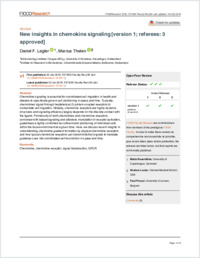New insights in chemokine signaling
- Legler, Daniel F. Biotechnology Institute Thurgau (BITg), University of Konstanz, Kreuzlingen, Switzerland
- Thelen, Marcus Institute for Research in Biomedicine (IRB), Faculty of Biomedical Sciences, Università della Svizzera italiana, Switzerland
-
23.01.2018
Published in:
- F1000Research. - 2018, vol. 7, p. 95
English
Chemokine signaling is essential for coordinated cell migration in health and disease to specifically govern cell positioning in space and time. Typically, chemokines signal through heptahelical, G protein-coupled receptors to orchestrate cell migration. Notably, chemokine receptors are highly dynamic structures and signaling efficiency largely depends on the discrete contact with the ligand. Promiscuity of both chemokines and chemokine receptors, combined with biased signaling and allosteric modulation of receptor activation, guarantees a tightly controlled recruitment and positioning of individual cells within the local environment at a given time. Here, we discuss recent insights in understanding chemokine gradient formation by atypical chemokine receptors and how typical chemokine receptors can transmit distinct signals to translate guidance cues into coordinated cell locomotion in space and time.
- Language
-
- English
- Classification
- Biology, life sciences
- License
- Open access status
- gold
- Identifiers
-
- RERO DOC 327166
- DOI 10.12688/f1000research.13130.1
- ARK ark:/12658/srd1319172
- Persistent URL
- https://n2t.net/ark:/12658/srd1319172
Statistics
Document views: 197
File downloads:
- Texte intégral: 226
